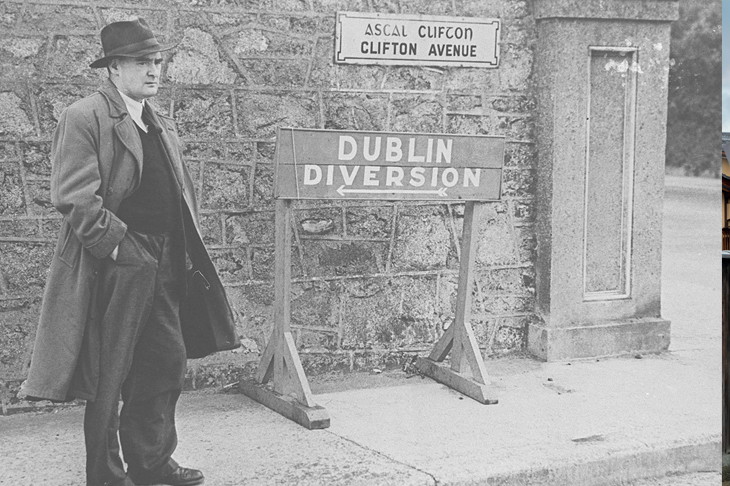It is tempting to compare two highly intelligent, learned and gifted young Dublin writers, suffering under the burdensome, Oedipal influence of James Joyce, struggling to have their first novels published in the late 1930s. Samuel Beckett’s Murphy, whose central character is an extremely idiosyncratic young man in the grip of profound indolence, was published in 1938; Flann O’Brien’s At Swim-Two-Birds, whose central character is an extremely idiosyncratic young man etc., in 1939. Murphy is great fun, but its author went on to purify and yet somehow at the same time enrich his prose style, and would win the Nobel; At Swim-Two-Birds (and its successor, The Third Policeman, written immediately afterwards, but never published in its author’s lifetime) is considered by many to be the high point of O’Brien’s output, and its author died, basically of drink (and inept medical treatment), in 1966, 23 years before Beckett, who was five years his senior. In 1961, O’Brien called AS2B (his preferred acronym for the book) ‘juvenile trash’.
Comparing Beckett and O’Brien is perhaps invidious, but it does raise at least one question: where, for O’Brien, did it all go wrong? ‘In a bottle’ is the short answer, but there are further clues in this collection of his letters.
For a start, let’s take that word ‘his’. In O’Brien’s case, the third person pronoun becomes slippery. Born Brian O’Nolan, he had possibly an uncountable number of pseudonyms, but the ones best known to us are Flann O’Brien, Myles na gCopaleen, the Brother; other pen-names come here, such as Lir O’Connor, whom O’Brien, writing as O’Brien, would castigate in the correspondence columns of the Irish Times. (‘Sir, — I see that Mr O’Connor has written another letter to your paper without giving any clue as to whether he intends himself to be taken seriously.’) O’Connor, in his turn, would castigate O’Brien. ‘F.O.B.’s final gaffe lay in the suggestion that Joseph Conrad was not, in fact, a full-blooded Irishman. This ugly innuendo can be dictated only by the writer’s implacable hatred for all that is Gaelic and good.’ The fantasies that sprang from his brain and were transmitted in the correspondence pages of the Irish Times are at least as good as anything he wrote in ‘Cruiskeen Lawn’ (the column he was awarded by the Irish Times for these very letters):
However, it was not to boast of my antecedents that I elected to joust with Mr O’Brien, but to clear Jos. Conrad of the charge of being a wop. Josephine Cumisky or Joseph Conrad as she was afterwards called, was born and spent the earlier years of an exciting life dreaming the hours away on the gentle slopes of the Galway Mountains. Cool, slim and unhurried, this lissom slip of a girl had the sea in her blood, and willingly, nay eagerly, she answered to its call.
I can’t say that these exchanges quite make up for the book’s cost alone, but they certainly go a long way.
Notice, though, that ‘wop’. Here, I think, the racial slur is inverted, turned in on itself as part of the joke, as if to say: only the kind of idiot who would believe this would use the word ‘wop’ (which, deliberately, isn’t even the right word). However, in 1962, he starts asking the question of whether St Augustine was ‘a nigger’, and he keeps using that word. Maebh Long, in a nicely judged footnote, says that this usage and O’Brien’s views on this matter ‘unquestionably disappoint’, but she directs us to a ‘Cruiskeen Lawn’ column of 1943 ‘in which he points out that racist discourse can lead to the anti-Semitism of the second world war’. (She doesn’t quite define her terms, though.) The point is that, as you can see from these letters, O’Brien was to become more irascible, nastier even, as he aged, and years of hackwork and lack of appreciation, not to mention booze, chip away at his self-esteem. There are still jokes, but they have a sourer edge, and the fact that the MS of The Third Policeman was festering away in a drawer, like a shameful secret, can’t have helped matters (he cannibalised it to make the inferior The Dalkey Archive, but at least it gave us the name of this admirable imprint). Add to all this the kind of melancholy which is often a feature of talented comedians with more going on in their brains than they can express under one name, and it is all rather horribly understandable (cf. Peter Cook, in his later years, going on radio talk shows in the persona of Sven, the depressed Norwegian fisherman).
But when the jokes are good, they are cracking. Anthony Cronin, O’Brien’s biographer, considered his skits on, say, Ibsen’s toupée falling into a soup-tureen facetious and impossible to find funny today, but I beg, very much, to differ. To continue the adventures of Joseph Conrad quoted above (and I have to quote at length to give the full effect):
The years had left their mark on Josephine Cumisky. No longer cool, slim nor unhurried, it was a warm-hearted, buxom matron that won the affection of Sand, tired out by a life spent tuning Chopin’s grand piano. The ceremony which united them was a simple affair, the Service being read by Capt. Conrad himself in a chop suey joint in the European quarter. The rest of my story is common history. How they came to live at Hawleigh as paying guests with Ibsen and my father waiting on them hand and foot. How Sand’s tuning key came to take its place with his wife’s goatee over the massive fireplace in the dining hall, where, I understand, they may be seen to this day on payment of a small pourboire to the guide.
‘The rest of my story is common history’ is hilarious, surely, and the word ‘pourboire’ is the flourish of one who can make the English language dance for him (as he could make Latin and Gaelic dance, too). Or try this: ‘It occurs to me that Mr O’Connor’s letter is not intended to be taken seriously. Very well, if it is, but if the presentation of a serious play by Chekhov in the Gate Theatre is to be made the occasion for oafish jokes, then the sooner we get into the war the better.’ Several targets are being hit here: the Dublin cultural scene, the very notion of pedantry, and, with bizarre genius, Irish wartime neutrality (this is 1940). But also, most tellingly, O’Brien himself.
O’Brien’s career revived in the last years of his life, and even this magazine can congratulate itself on having played a small part in this, having given him good reviews of At Swim-Two-Birds both on its original publication and on its 1961 reissue, which reintroduced him to an appreciative public; and to this day AS2B remains, I think, the book that people pretend to have read more than almost all others except, of course, Ulysses. (The giveaway is when someone places equal stress on each word, rather than on the second, which a certain well-known historian, whose name I have promised to keep out of this, would do well to remember.)
As is often the case with volumes of collected correspondence, this is primarily a book for scholars, but you don’t have to be too much of an O’Brien academic or obsessive to enjoy this. (There is a letter written by him under his real name, B. Ó Nualláin, in his capacity as a civil servant in the Department of Local Government and Public Health, fully professional and entirely without interest, except insofar as it illustrates that O’Brien could turn the comic tap off so fully no one would expect there to have been one in the first place.)
For scholars, but not exclusively; yet, to close on a sourish note, I wish the editor had had a lighter hand with the footnotes. I really don’t think anyone coming to this book is going to need to be told who Keats, say, or Wordsworth, or Ibsen, were; in fact, I was mildly surprised, by the time his name came up, not to see Shakespeare glossed for the casual reader. And coming, as these footnotes do, under wildly whimsical fabrications about literary figures, you wonder what Flann O’Brien himself would have had to say about them.


















